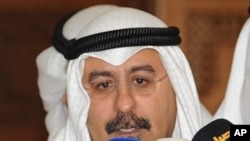International criticism is growing over Syria's crackdown on political dissidents demanding the ouster of President Bashar al-Assad. Now Saudi Arabia and its Gulf neighbors are joining the criticism as Syria steps up its attacks on opposition activists.
The decision by three Gulf states to withdraw their ambassadors from Damascus Monday follows the strongly worded message by Saudi King Abdullah a day earlier warning Syria to choose the “path of wisdom, stop the bloodshed, and adopt a full slate of reforms.”
Kuwait and Bahrain followed Saudi Arabia's lead by announcing the withdrawal of their ambassadors ratcheting Arab pressure on the embattled government of President Bashar al-Assad. Qatar withdrew its diplomats last month.
Kuwaiti Foreign Minister Sheikh Mohammad Sabah al-Salem Al Sabah told journalists that the decision to withdraw Kuwait's ambassador from Damascus will soon be followed by further joint action by Gulf states:
He says the wall of Arab silence regarding Syria has now been broken by withdrawing our ambassador from Damascus and Gulf Cooperation Council foreign ministers will soon meet to put together a joint Gulf initiative to deal with the crisis in Syria.
Arab League Secretary General Nabil al Arabi urged Syria, in a statement carried by the Egyptian news agency MENA, to “stop all acts of violence” immediately, adding that that there was still time to carry out reforms promised by President Assad. He also indicated that the Arab League was ready to help solve the crisis.
Saudi commentator and analyst Jamal Khashoggi says growing Arab pressure on Syria could help to convince the U.N. Security Council, especially China and Russia, to take stronger action against Damascus:
"I think we are heading for an international movement to cripple the Syrian regime," he said. "There will be more consultations between Saudi Arabia, the Gulf Cooperation Council, Turkey, the United States and France. Kuwait announced the withdrawal of its ambassador from Syria, so now that will [pave] the ground for the U.N. Security Council to take a decisive decision to allow more pressure on the Syrian regime."
Khashoggi says the increasing pressure from Gulf States should harm Syria economically, “causing a cash flow problem that will damage the regime's alliance with the merchant classes in Damascus and Aleppo.”
He stresses that Western “tactics must stop short of provoking a conflict with [Syrian ally] Iran," while at the same time preventing Tehran from middling in Syria. Turkey, he points out, has begun to block Iranian arms shipments to Syria and Lebanon's Hezbollah group.




